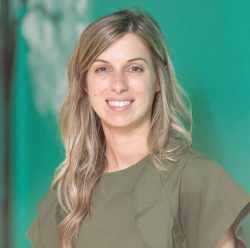Making Connections; Sally Guidry, M.S., LBA, BCBA
At a time when dyslexia wasn’t widely understood, Sally Guidry’s sister struggled tremendously with school. Guidry accompanied her family to countless tutoring and behavioral psychology appointments and found herself intrigued by the process.
 “The psychologist seemed to be helping our family in areas of behavior and life skills that were probably even more important than improving academically,” Guidry says. “From a young age, I was exposed to the idea that everyone can learn through hard work and the right kind of help from others.”
“The psychologist seemed to be helping our family in areas of behavior and life skills that were probably even more important than improving academically,” Guidry says. “From a young age, I was exposed to the idea that everyone can learn through hard work and the right kind of help from others.”
Today Guidry, M.S., LBA, BCBA, is the clinical director at Creating New Connections, a group of therapists offering services to help improve the lives of individuals with Autism Spectrum Disorder.
What sets Creating New Connections apart, Guidry says, is that all of the staff members specialize in the practice of applied behavioral analysis — a collection of research-based procedures that uses positive reinforcement to change behavior. Most of the therapists are also graduate-level, board-certified behavior analysts.
Creating New Connections therapists offer a variety of resources for autistic children and their families, including social and play skills, academic work, and speech and language. Over the last year, Guidry and Christine Tilley, M.S.Ed., LBA, BCBA, the owner and director of Creating New Connections, have developed a highly anticipated Autism Spectrum Parent Education Course to include those concepts they found to be missing from traditional services across their combined years of experience.
“Our goal is to empower parents and caregivers to feel confident and capable in raising their child and making decisions for their future,” Guidry says. “By teaching more about autism and applied behavior analysis, we want to challenge misconceptions about autism and support families in advocating for effective, evidence-based services.”
They also plan to offer a social skills program for teens in the fall. Guidry says that older children and young adults with autism are still under-resourced in New Orleans. This new offering sets up social groups that will focus on establishing friendships, while learning key job-readiness skills for the future.
Guidry’s interest in the science of behavior and how people learn started with her sister but was further fostered through her psychology practicum at LSU along with her master’s degree in ABA and certification in Autism Studies from Ball State University. She worked for five years at the Brooklyn Autism Center in New York before returning to New Orleans.
“The children I have worked with throughout the years have deeply influenced who I am and what I believe in,” Guidry says. “Through my time with them, I’ve experienced directly how many small successes daily turn into big change over time.”
And Guidry knows firsthand what big change looks like. Her sister made amazing progress learning to live with dyslexia and eventually graduated from college with excellent grades.
“There was an understanding in our family that we need to be thankful for the skills that come naturally to us, to be more accepting that it’s not the case for everyone,” Guidry says. “It’s then our job to love them more and figure out how to help. I’m committed to being that helper to parents and kids today.” creatingnewconnections.com
The Creating New Connections Mission
New Orleans Living: Why do children with autism need better connections?
Christine Tilley: We think of Creating New Connections in many different ways: Our goal is to teach children how to be successful in a variety of settings in order to improve the quality of life for them and their families. Keep in mind, we can all benefit from making use of the principles of ABA — not just individuals with autism!
NOL: How do you teach connections?
CT: Teaching communication skills is often a major focus of our therapy. If an individual can’t communicate, he cannot connect with others. In addition, we aim to increase synaptic connections by teaching new skills; social connections by teaching how to interact and communicate with others; and, to more broadly, allow the community to benefit from creating connections with these remarkable kids by increasing awareness and involvement in community activities.
NOL: What is the Creating New Connections mission?
CT: Our mission is to improve the lives of individuals with ASD and their families by increasing awareness and education. We believe individuals on the autism spectrum deserve to be — and can be — better understood and supported in their homes, schools and in the community. We aim to bring attention to the unique strengths and challenges of those with ASD and to share how our lives have been enriched through our experiences teaching individuals with ASD. We find great value in learning to see and experience life in ways that are considered different from the ‘norm.’
